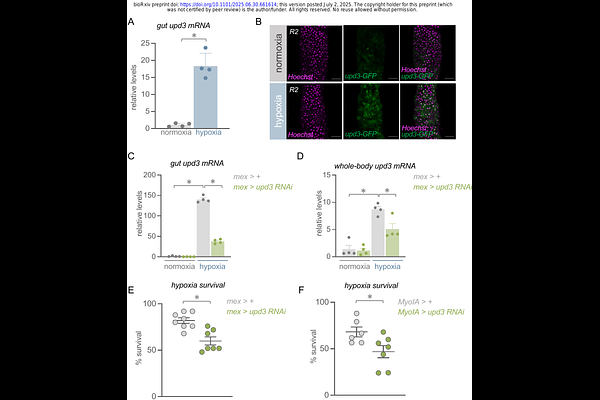Cytokine control of systemic hypoxia tolerance in Drosophila.

Cytokine control of systemic hypoxia tolerance in Drosophila.
Ding, K.; Bodkhe, P.; Lee, B.; Polan, D.; Wycislik, A.; Cheung, T.; Wu, S.; Grewal, S. S.
AbstractSystemic hypoxia - reduction in oxygen supply to all tissues and organs - occurs in both physiological and pathological conditions in animals. Under these conditions, organisms must adapt their physiology to ensure proper functioning and survival. While extensive research has characterized how individual cells sense and adapt to low oxygen conditions, the mechanisms that coordinate whole-body responses to systemic hypoxia remain poorly understood. In this study, we uncover an interorgan signaling response mediated by the cytokine Unpaired-3 (upd3) that is important for systemic hypoxia tolerance in Drosophila. We demonstrate that hypoxia rapidly induces upd3 expression and activates JAK/STAT signaling in both larvae and adults. Interestingly, we discovered a sex-specific requirement for this pathway, with females requiring upd3 for hypoxia survival while males do not. We also identify the intestine as a critical source of hypoxia-induced upd3 and show that gut-derived upd3 signals to the fat body and oenocytes to mediate hypoxia tolerance by promoting nitric oxide synthase expression. Furthermore, we reveal an unexpected role for the canonical hypoxia response transcription factor HIF-1/sima as a molecular brake, preventing lethal upd3 overproduction, revealing that hypoxia survival requires precise cytokine dosage control. Our findings define a gut-to-fat/oenocyte signaling axis that coordinates systemic hypoxia adaptation, highlighting the complex interplay between classic hypoxia response pathways and cytokine signaling in maintaining organismal homeostasis during oxygen limitation. This work provides important insights into how organisms adapt to systemic hypoxia, with potential implications for understanding systemic hypoxia-related human pathologies such as respiratory disorders and sleep apnea.